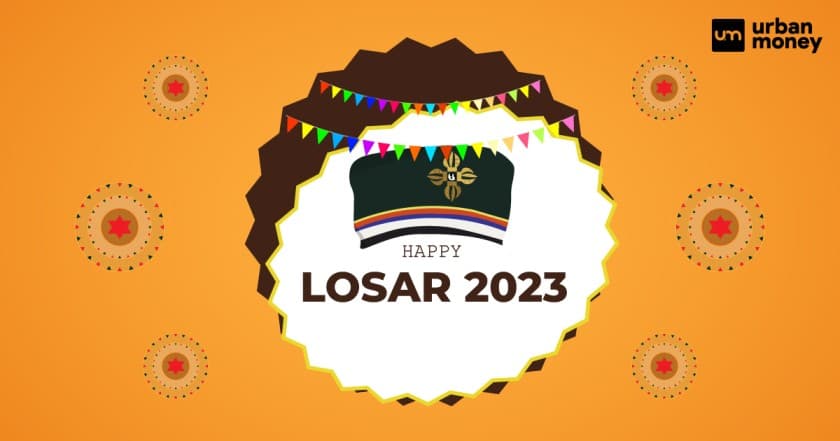- Home
- Indian Holidays
- Losar Festival
Losar 2025

- Personalized solutions
- Expert guidance
- Application assistance
- Credit score discussion
- Interest rate comparison
Table of Content


Last Updated: 20 December 2025
The Losar festival, also known as Tibetan New Year, is the most significant Buddhist event for recognising the beginning of the New Year and the harvest season. It occurs on the first day of the first Tibetan lunar month (in February or March).
When Is Losar 2025 Celebrated?
In the Himalayan region, Losar is a widely observed festival that lasts roughly 15 days (from February 28 to March 14, 2025). Nepal, Bhutan, the Sikkim state of India, and the Tibet Autonomous Region of China all observe public holidays today. In India, Losar is celebrated in states like Arunachal Pradesh, Leh-Ladakh, Himachal Pradesh, and Darjeeling.
Losar Festival Meaning
In Losar, as in India’s Vaisakhi, there was also an element of thanksgiving for the crop. When Buddhism permeated Tibetan culture, Buddhist rites and practices were included in Losar festivals. According to legend, Belma, an older woman who lived during Pude Gungyal’s tenure as the ninth monarch of Tibet, taught people how to calculate time using the moon’s phases. As a result of this notion, some locals call Losar Bal Gyal Lo, where Bal stands for Tibet, Gyal for the King, and Lo for the Year. The enthronement of the king is also observed on this day.
The three-day Loser Festival usually falls on a day that is also Chinese New Year, but the exact date fluctuates every year. The festivities for Losar start in homes throughout the month before the festival by remembering its eight auspicious symbols. In houses and monasteries, these are drawn with white powder. In monasteries, ceremonies are performed to pay homage to deities like the Dharampalas (the eight terrifying Gods who guard Buddhism against evil) and wrathful deities.
How Is The Losar Festival Ladakh Celebrated?
The Losar Festival Ladakh is celebrated with prayers, ceremonies, dancing, and family reunions. The main Losar celebrations start two days before the Tibetan New Year and end on that day.
Day 1: Lama Losar- Lots of Cooking and Cleaning
A special Tibetan holiday noodle soup called Gu-Thuk (also known as “nine noodle soup”) is prepared as people meticulously clean their homes or rooms. Families go to monasteries to pray with the lamas, show homage, and get blessings. Changkoi, a beer-based beverage, is served to those present on this day.
Day 2: Gyalpo Losar- The Eve of Tibetian New Year
In the Tibetan calendar, religious rites are performed on the last day of the month. People visit the monks to pray and give them presents. To expel evil spirits, the monks perform a protector deities’ puja (ceremony). People light fire torches and use firecrackers to celebrate at night. This is said to frighten the evil spirits away.
Day 3: Choe-Kyong Losar- The Tibetian New Year’s Day
People get up early on the first day of the new year, take a bath, and wear fresh clotHomemakerswives who get up before dawn and travel to neighbouring waterways collect the first bucket of clean water. This is thought to bring the family luck. Then, they place offerings and water on their home altars to ensure a prosperous harvest in the coming year.
On the day of the Tibetan New Year, the family members get together for a reunion supper, exchange gifts, and spend time together.
Even though the festival closes on this day, there are still 12 more festivities. The second day of the new year is spent visiting friends and family and taking in the chanting, dancing, music, and ceremonies at nearby monasteries.
History Of Losar Festival Ladakh
Losar celebrations have their roots in Tibet’s pre-Buddhist history. The origins of these celebrations may be traced to the 17th century when Buddhism was introduced to Tibet, and the yearly Losar festival, which takes place in Ladakh during the reign of the 9th Tibetan King, Pude Gungyal, combines the harvest festival and the Bon tradition of burning incense. A Metho ceremony with a parade of people holding flame torches and shouting prayers typically kicks off the festivities. It is thought to expel evil spirits, and negativity gathered throughout the year.
A month before the celebration, the villagers start preparations by cleaning their homes and removing any outdated or unnecessary objects to ward off bad luck and preserve peace and prosperity. Rehearsals are happening in various regional locations, adorned in flashy, vibrant colours.
Where Is The Losar Festival Celebrated?
The people of the Himalayan region widely celebrate the Losar festival. Tibet, some areas of China, Bhutan, Nepal, Sikkim, Leh-Ladakh, Darjeeling, Arunachal Pradesh, and parts of Himachal Pradesh.
Why Is The Losar Festival Celebrated?
The celebration was created long before Buddhism was honoured as a way to express gratitude to the Gods. Losar, first observed mainly by farmers, evolved into a Buddhist celebration honouring the start of the New Year.
Significant Attractions Of the Losar Festival
- Dance Theatre
The locals participate in traditional dances and theatre acts.
- Tournaments
The greatest one is engaging in fights that will enthral the crowd and enhance the festival atmosphere.
- Folk Musical Display
The energetic musical performances revitalise the environment and infuse it with good vibes to signify that the Tibetan New Year is about to begin.
- The Famous Metho Procession
Metho is a nighttime fire procession in which participants march through the marketplaces while reciting pious phrases. One of the festival’s main highlights is this procession.
How is Losar Celebrated (Tibetan New Year)?
The Losar celebration is frequently misinterpreted as the devil’s dance. The locals take great pride in celebrating it to attract happiness and success.
The public observes this holiday with extensive preparations and a small amount of religious tradition. They pray before their local deities early in the morning after lighting lights.
Frequently Asked Questions (FAQs)
What is a Losar celebration?
In Tibet, people celebrate Losar, also referred to as the Tibetan New Year. Depending on local customs (Tibet, Bhutan, Nepal, and India), the festival is observed on various days.
Is Gyalpo Losar a public holiday?
Yes, Gyalpo Losar is a public holiday.
Why do Buddhists celebrate Losar?
In Buddhism, the traditions surrounding Losar go back to the old ages when Tibetans practised the Bon religion. Every winter, a religious event was held where worshippers gave incense smoke to the local gods and spirits in the hope that they would protect the community and its surroundings.
